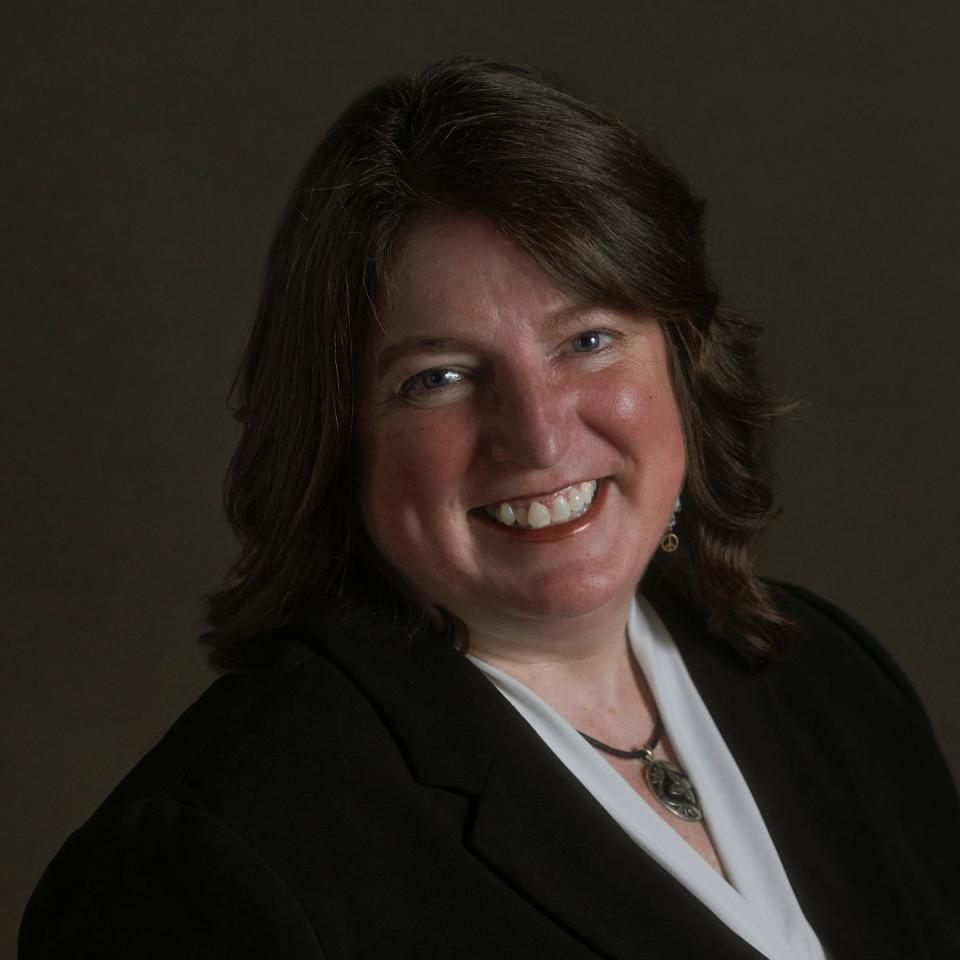Election Guide: Is poverty an obstacle to justice? District Judge Candidates weigh in
The Courier Journal, together with the League of Women Voters of Louisville and the Louisville Bar Association identified court-specific questions for the candidates seeking election with the intention of helping voters get to know the judicial candidates in a way that is helpful in the voting booth. These questions were for District Court candidates.
More:Election Guide: Every Jefferson County Judge seat is on the ballot. Here's what to know.
What do you see as the greatest obstacles to justice, if any, and specifically for minorities and their high rate of incarceration?
District Court, Division 1
Anthony Jones
"It is the primary function of the judge to fairly and equally apply the law to a specific case. Race, sexuality and gender should never play a role in any decision that a judge makes. As judge, I would follow the law as codified in the Constitution and Kentucky Revised Statutes, and utilize evidence based reports provided by pretrial services to ensure that every person that comes before the Court is treated equitably."
Emily Korfhage Monarch
"Asking an attorney to pick the greatest obstacle to justice is like asking a mother to pick her least favorite child—it depends on the situation and the moment. Judges must continually balance keeping our community safe with all of the human factors (drug addiction, untreated mental health issues, systemic biases, lack of resources such as public defenders, prosecutors, clerks, alternative treatment programs) that stand in the way of an effective justice system."
District Court, Division 3
Kelly Ann Bowles
"Bail, closure of courts and implicit bias are the greatest obstacles for justice. Cash bail for nonviolent crimes statistically penalizes people of color at a much higher percentage rate, causing people to lose jobs, housing and care for children. Additionally, the current situation where courts only have dockets part-time makes the process much longer for all parties, causing pass dates to be weeks, if not months, away. Furthermore, implicit bias and systemic racism continues to cause barriers to justice. All personnel should receive implicit bias training, and we need to do a better job of checking our privilege and bias when making decisions that affect the community, holding ourselves accountable by encouraging transparency and record keeping of statistics."
Kristina Garvey
"Lack of funding and resources. We lack funding and resources in the criminal justice system at all stages and levels and across all justice partners. From lack of funding for legal representation, education, staffing and legal fees, to lack of treatment options for those battling mental health issues and drug addiction. All contribute to high incarceration rates. As someone who has spent the last 8 years working in District Court, there’s no question we need more resources to address the problems our community and community members are facing."
District Court, Division 4
Yvette De La Guardia

"Poverty, implicit bias and the public's lack of confidence in our justice system. I've also met many citizens who do not feel comfortable or safe coming to the courthouse because of a language barrier. As a district court judge, I'd like to help improve the court's language access and cultural competency."
Lora Chisholm Holman

"I think the greatest barrier to justice, regardless of race, is poverty. When defendants can't afford to post a bond, they might sit in jail for weeks or months pending a trial date and could lose their job in the process. If defendants don't qualify for a public defender but also can't afford to hire private counsel, they may be in a situation where they have no attorney to assist them and are facing a prison sentence or have an attorney initially but can't afford to proceed with an appeal if necessary."
District Court, Division 6
Justin C. Brown
"The exclusive use of the cash bail system is a tremendous obstacle to justice that leads to a large number of people incarcerated pretrial. This system undermines the presumption of innocence resulting in economically and racially divergent impacts and pretrial detention lengths.
"Incarceration leads to severe ripple effects for the individual and their families; such as loss of job/income, loss of housing, the breaking up of families, etc. These real world considerations oftentimes lead to an incarcerated person pleading guilty simply to get out of jail so that they don't lose everything. Is that justice? I will use common-sense guidelines and follow the law in the setting of reasonable bails. There will always be an orange jumpsuit ready for violent and dangerous offenders (as determined by statute and other Pre-Trial tools). But, it is better to have those accused of low-level, non-violent offenses working and providing for their families via cash-bail alternatives."
Lisa L. Langford
"The greatest obstacles to justice for minorities and those who are in poverty, are numerous. Published studies show the lack of access to equal education, employment, housing, mental health services, general health services and more, create a societal gap. The gap must be lessen, beginning with our children to reduce the pipeline to prison numbers. We need to level the playing field for everyone by making sure that all of the citizens in Jefferson County have equal access to education, employment, housing, and medical resources."
District Court, Division 7
Shannon Renee Fauver

"The entire system is short-handed. We need more public defenders, clerks in the court houses, social workers, mental health workers and yes more correction and police officers. At this point, the system isn’t working when we don’t enough people to do the jobs needed. For those in custody, we don’t have enough correction officers to make sure that everyone is safe, as has been seen with 11 deaths, to date, in custody in jail here.
"Further, being short-staffed means everyone’s cases go slower and having a charge linger for any reason over a person, can impact their job, custody of their child, and much more.
"The fact that minorities have been historically charged and incarcerated at higher rates needs to be addressed so that judges make decisions with all the facts in front of them, and to treat every person as an individual, to not rule on a person being from a higher crime area or a poorer area and assuming that the person is guilty because of where they are from etc. Which it is why it important to elect Judges who have extensive experience to make sure that everyone is treated fairly and justly."
Megan McDonald

"Poverty and lack of education are impediments to full access to the court system. Obviously, judges can appoint attorneys to represent indigent defendants. However, judges also must be sensitive to neurodivergence and mental illness within the community, issues that are not always obvious. The judiciary has great control over incarceration rates through both sentencing and the setting of bail. District judges preside over arraignment and decide whether an individual will be held (incarcerated) or released. It is my strong belief that in the vast majority of circumstances, the only people who need to be incarcerated are violent offenders, those that pose a threat to the community. I also support the availability of specialized courts such as drug/recovery court and veterans court and would encourage expanding those dockets to reach more members of the community who may have limited access to legal help."
District Court, Division 8
Karen Faulkner

"Specifically in District Court, which handles low level criminal offenses and violations, we need to rethink our automatic use of incarceration as a starting point, which disproportionately affects minorities. Our jail is filled with those suffering poverty, mental illness and drug addiction, and it is ill-equipped for these issues. Utilizing alternative pre-trial and sentencing options, that begin to address the problem that led an individual to Court, rather than using the jail as a catch-all in every case, is imperative. Judges have the power to order treatment, court monitoring, or home-incarceration as alternatives at any point within the process. When we reduce our jail population, we will be able to focus on the resolutions and ensure justice for everyone involved. My work on the Jail Policy Committee, with partners including the jail, the judiciary, and prosecutors among others has been focused on this resolution and I will continue this eye towards progress on the bench."
Jessica Stone

"This is the sort of question that really needs community input and involvement to get to the root causes of the obstacles to justice. Minorities are at a higher risk of encountering a lack of opportunities and role models. In many situations, by the time an individual encounters the court system, it is too late.
"Through campaigning, I’ve learned what some community members believe are the causes, and their solutions make sense. Answers are with the people, and judges should be asking community members how the justice system can improve. I learned a lack of lighting in the west end promotes criminal activity. It broke my heart to learn sports fields are not maintained in some areas. There are easy solutions to lessen the risk of our children having to chose crime over wellness to survive. When I am judge, I will hold community roundtables to collaborate to stop the cycle."
District Court, Division 9
Kaitlin Smith Dean
Kaitlin Smith Dean did not respond to The Courier Journal's request to answer these questions for publication.
Tanisha Ann Hickerson
"There are various obstacles to justice and different ones affect different people in different ways. Lack of legal representation due to inability to pay an attorney may not affect someone who qualifies for the services of the Public Defenders office, but someone just above the poverty guidelines may have difficulty hiring an attorney. Yet, both may struggle financially from missing work, and choose to quickly resolve a case as opposed to fighting to and through trial.
"Upon resolution, people may struggle to pay fines and court costs, which in turn could lead to revocation or other punishment. Both civilly and criminally, people may not fully understand their rights and/or grievances for which to seek legal help and therefore do not seek justice. Further, there are real biases in our court system, which have led to minorities and poor people receiving harsher sentences than white people and wealthy people. Therefore, overall, I believe such obstacles are rooted in systemic failures related to racism and poverty. Hence, leading to the high rate of incarceration of minorities. Lastly, for some incarceration can lead to recidivism, complicated by lack of opportunities for successful re-entry and financial/employment impediments for those with certain criminal records."
District Court, Division 10
R. Christian Garrison
"Implicit Bias. Judges are not experts on all things. In fact, the law is very clear about that. And the experts have informed the criminal justice system that we have a problem - implicit bias. We cannot continue to ignore the experts and also state we are not experts on all things. Therefore, judges, prosecutors, public defenders, defense attorneys, police officers, corrections officers, probation and parole officers and anyone employed in the criminal justice system MUST have mandatory and continued training on implicit bias."
Sara Michael Nicholson
"I believe that poverty is the number one obstacle to justice, in both criminal and civil matters. Public defenders, legal aid attorneys and social workers are woefully underfunded and extremely overworked. Other factors within the justice system having an impact are: systemic unconscious bias, distrust of the justice system, inadequate victim advocacy, and inadequate state and local government funding."
District Court, Division 15
Mary Jude Wolford

"I believe the greatest obstacle to justice is access to qualified representation. Studies have shown that a minority defendant may be less likely to hire a private defense attorney, and therefore must rely more on public representation. While our public defenders do an amazing job, I witnessed first hand while working as a prosecutor in District Court everyday just how drastically overworked they are.
"We need to press our legislature to increase funding to the Department of Public Advocacy so that they may not only hire more attorneys, but pay them a better wage so that as they gain experience, they are not lured away by higher paying positions. This same reasoning applies to hiring and retaining prosecutors in the County Attorney’s Office who represent the victims and overall community in criminal cases. Raising the quality of legal representation in both the public defenders’ and county attorney’s offices will improve the overall level of practice in District Court, thereby benefitting everyone who passes through this court—not just those who can afford private representation."
Claudette Patton

"Improving access to justice is increasingly recognized as a critical dimension of tackling inequality among minorities. The inability to access justice services can be both a result and a cause of disadvantage, which can become generational among minorities if not addressed.
"Access to justice tends to occur in combination with other socioeconomic factors and justice services is often found to have a disproportionate impact on the low-income and other disadvantaged groups, precisely because of their lack of individual economic resources. This in turn can further undermine their ability to enforce their economic and social rights which can contribute to higher rates of incarceration. For small minority owned businesses, inability to resolve legal problems, including disputes, may result in losses of employees, ceasing certain types of trading and incurring additional costs, thus hindering growth.
"In addition, inability to resolve legal problems may diminish access to economic opportunity, reinforce the poverty trap, and undermine human potential. In short, providing suitable legal advice and assistance for accessibility to justice can contribute (among other factors) to helping people move out of some of the worst experiences of social exclusion and enable equal access to economic opportunities, thereby reducing the rate of incarceration."
How would you deal with difficult parties and attorneys in your courtroom?
District Court, Division 1
Anthony Jones
"Every week I encounter scores of attorneys and unrepresented Defendants. One benefit to being trained as a Prosecutor and Public Defender is that I appreciate the importance of the adversarial system and can understand the opposing party’s perspective, even in uncomfortable moments. I pride myself on my ability to deescalate situations before they get out of control. Sometimes, that requires relying on my sense of humor. Other times, that requires a frank discussion. I understand that a judge must be able to calmly control their courtroom. As a judge, I will make every effort to hear all affected parties, but I will not allow one party to disrespect another or the Court. In most cases, I would give the difficult party one instruction on proper courtroom decorum, then, if they persist in their behavior, sanctions may be levied. I want every person coming before the Court to feel safe, feel heard and feel that they can state their case without unnecessary distraction."
Emily Korfhage Monarch
"I am a mom to three children, including a tween and a teen daughter who share living space. I am no stranger to managing disagreements and (sometimes) difficult behavior. I have found that most of the time what people want is to feel seen and to feel heard. From toddlers to teenagers to difficult attorneys, managing relationships requires a delicate balance of respect, patience, boundaries, consequences and humor."
District Court, Division 3
Kelly Ann Bowles
"As an attorney, teacher, and mother of three kids 'difficult parties' is part of my everyday experience. Consequences for behavior is essential in legal, educational, and familial settings. However, policing tone or emotions is not the role of the judiciary, and ultimately can penalize people from different cultures differently. Taking culture, background, and language into consideration is essential to setting boundaries in the courtroom and dealing with difficult parties, attorneys and courtroom personnel included."
Kristina Garvey
"Every situation is different and has to be evaluated individually. Sometimes, there may be mitigating factors that need to be considered when dealing with a difficult situation, or person, in the courtroom. I think it is important to treat all those in the courtroom with respect. As the presiding Judge, I expect those who enter my courtroom to treat the Court, as well as all those in it, with respect,. Depending on the circumstances, I typically look to de-escalate any difficult situation and take appropriate steps to keep the situation from becoming more difficult or from happening again."
District Court, Division 4
Yvette De La Guardia
"Although courtrooms are often filled with tension and disagreement, judges must always be patient and actively listen to the parties and attorneys. In difficult situations, I would carry out the court's responsibility to maintain order and decorum by admonishing the parties and attorneys for any inappropriate courtroom conduct."
Lora Chisholm Holman
"I would require all people in the courtroom to be respectful to everyone present be it the judge, sheriff, clerks, opposing counsel or other parties to the case. I would give someone a warning to curb their behavior and if they continued, I would ask the sheriff to remove them from the courtroom until they can calm down and act appropriately. All people coming before the court (including defendants and witnesses) deserve respect and the courtroom proceedings require the respect of all parties so that each case can receive the attention necessary to resolve."
District Court, Division 6
Justin C. Brown
"In my nearly 20-year legal career, I have found that the vast majority of litigants and opposing parties are professional, congenial and well-prepared. Moreover, it has been my experience that parties treat one another, the court staff and the Judge with respect. My reputation as a litigant is one of relaxed, quick-witted and good-natured temperament; a tireless, but respectful advocate for my clients. I believe that this temperament will serve me well as a judge. That being said, if a party or a litigant becomes disrespectful to the other party or to the Court; it will not be tolerated. A courtroom only works when respect and decorum is shown to those with opposing views; any contrary conduct will be dealt with swiftly. When I am elected District Judge, it is my courtroom. Period. I will issue one warning to the offending party and if his/her nonsense continues, I will not hesitate to use my contempt powers and to have my sheriffs take the person into custody."
Lisa L. Langford
"In my four years as a Jefferson District Court Judge, there have been a few occasions when I had a difficult defendant. Generally, my first step is to assess what the issue is with the person. If it a matter of confusion with the system or the law, I explain it to them. If the person is displaying unwarranted anger toward staff or attorney, I advise that everyone in my courtroom is treated with respect and dignity. On rare occasions, the deputies have to get involved. Arguments and disrespect amongst attorneys is dealt with swiftly. I hold them to a higher standard. I remind them to respect each other and rarely ask them to return after a cooling off period."
District Court, Division 7
Shannon Renee Fauver
"I have been a practicing attorney for 18 years and we have all dealt with difficult people while practicing law. After 18 years of practice, I have people verbally attack me etc., because the legal situation is stressful by in large. What I have done, is one a person gets short, or rude, with staff or me, I usually tell them that is the one time they can do that, as I understand that the case is about their freedom, property, etc., and can help them if they take some time before addressing me again.
"While life experience is not required for our job, I have lived and worked in another country, and volunteered throughout our community and have seen when anyone gets pulled into Court, as it is generally one of the worst days of their lives.
"I believe that knowing and understanding that a person’s behavior in Court is not usually a representation of who they are and should be impact the rulings made on their case. While emotions run very high in a daily basis when people are in Court, a judge has to able to take any personality issues outside of the decisions she makes."
Megan McDonald
"Judicial temperament is very important. Judges must be patient while ensuring safety and respect for the process. Judges must also be sensitive to the fact that appearing in court is very stressful for most individuals and they are not in the courtroom because they want to be. It is up to the Judge to set the proper tone in the courtroom by treating everyone with respect and dignity. In those rare instances where that is not reciprocated, the Judge should respectfully issue warnings, with a contempt citation being a last resort."
District Court, Division 8
Karen Faulkner
"Judicial temperament is one of the most important qualities of a good judge. In my career over the past seventeen years, I have had the privilege of working with people from different walks of life. I know Court brings a lot of emotions for both the victims and the accused, and the attorneys involved. Dealing with difficult parties is something I have routinely encountered as public defender and in private practice. There is a need for an understanding that most people are experiencing life outside of the Courthouse which may bleed into their interactions with the Court, and also maintaining a level of respect and decorum in the Courtroom. Everyone who enters my Courtroom will be treated with fairness and respect. A judge has the power to maintain that respect, but this must start with the Judge herself. It is my goal to make District Court a place that benefits everyone that necessarily interacts with the system."
Jessica Stone
"I work in District Court everyday. I encounter difficult parties and/or attorneys pretty regularly. District Court is high volume, fast paced, and can be chaotic at times. Some call it a circus, but… that is why we love it. Being respectful and courteous goes without saying. Most folks just want to be heard, so in many situations, just being that person to listen and take time to hear their story or answer their question is enough. Sometimes it’s not. In the more difficult moments, one of the following reminders helps me remain poised and able handle the situation in stride:
Be kind. Everyone is fighting a hard battle.
You can learn something from everyone.
Treat others the way you would want to be treated."
District Court, Division 9
Kaitlin Smith Dean
Kaitlin Smith Dean did not respond to The Courier Journal's request to answer these questions for publication.
Tanisha Ann Hickerson
"As a judge, dealing with difficult parties and attorneys has been few and far between for the most part. For attorneys, I have sternly commented about decorum, collegiality and respect for the court. If there appears to be significant tension between counselors that is of concern to the court, then I may conduct a bench conference to further understand what is going on. I may try to help resolve the issue or encourage the counselors to resolve it off-docket.
"If I were to feel the level of difficulty or disrespect had gone too far and crossed into an action for which contempt of court is necessary, then I would have to consider that option. For parties, especially pro se people, I really try to explain to the person how their behavior or comments are inappropriate for court, could lead to unwanted consequences and will not be tolerated. Again, if the behavior escalates, then I could find that person in contempt, but that would really have to reach a certain level of difficulty and lack of respect for the court."
District Court, Division 10
R. Christian Garrison
"There's no one easy fix to dealing with difficult parties and attorneys in Court. But experience matters. How can you be an effective and respected judge in District Court if you've never practice law in District Court? Louisville needs judges who truly understand District Court. Louisville needs judges who understand the frustrations of the parties and attorneys in their Court. As a former public defender and prosecutor in Louisville, I understand. And when zealous advocacy required it, I've been that difficult attorney in District Court. If elected, I will bring balanced qualified change to the bench in District Court and be a judge that understands...a judge that has practiced in District Court."
Sara Michael Nicholson
"A judge should always set the tone in the courtroom. For many individuals, a court appearance can be very stressful and create a great deal of anxiety. It is critically important that judges show respect, remain calm, ask questions and listen carefully. In most situations, the emotions of difficult parties can be defused. If not, and things escalate to a point that it creates a possible danger to others; a sheriff’s deputy is standing by to assist. I certainly expect attorneys to conduct themselves in a professional manner, and my experience as a judge has been that the vast majority of attorneys do in fact represent their profession very well."
District Court, Division 15
Mary Jude Wolford
"If I become a judge, I will establish a tone of decorum and respect in my courtroom from the beginning, and demand this in return from all parties. If a party or attorney is especially difficult, I would first warn them about their unacceptable behavior. Depending on the situation, repeated warnings about specific behaviors may be necessary. If the inappropriate behavior still continues, a judge may find a party or attorney in contempt, and sentence them accordingly. "
Claudette Patton
"It’s important to differentiate between a difficult person and a dangerous person in the courtroom. The “difficult” case, attorney, witness or others in the courtroom presents challenges but is not dangerous. As District Judge it will be for me to start each docket with the right tone and expectation − the bench is the keeper of manners, decorum, respect and ethics in the courtroom. It’s important to note that each instance of dealing with a difficult individual in the courtroom raises important practical, legal and professional responsibilities. My training and experience that has prepared me to be a judge supports my setting expectations of civility, decorum and respect for one another and the judicial process, bringing truth, justice, and fairness to each case. "
Read more Q&As with candidates
District Court Candidates
Watch: Judicial Forum for District Court Candidates
Do the judicial candidates for District Court support bail reform?
What District Court Judge candidates say about protest charges
Circuit Court Candidates
Signing warrants? Circuit Judge candidates weigh in on accuracy and safety
What Circuit Judge candidates say about racial disparities in the courtroom
What methods would you use to deal with difficult litigants and lawyers?
Watch: Judicial Forum for Circuit, Appeals and Kentucky Supreme Courts
Court of Appeals Candidates
Not all Appellate Court Judge candidates have experience on the bench. Who's qualified?
What can be done to provide adequate access to legal help for all citizens?
Not all opinions are published from the Court of Appeals. Should they be?
Kentucky Supreme Court Candidates
This article originally appeared on Louisville Courier Journal: Is poverty an obstacle to justice? District Judge Candidates weigh in

